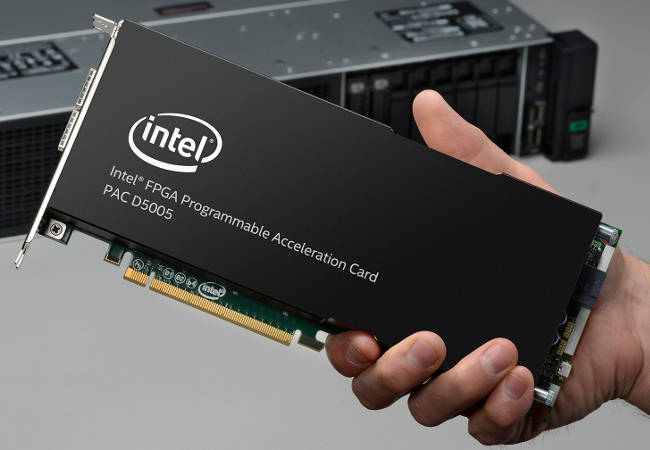Intel Axes Older FPGA Cards, Moves Development Into Hands Of Customers

Intel is discontinuing its original lineup of Programmable Acceleration Cards as it turns to an "ecosystem first" strategy that helps customers create their own FPGA-based products, including SmartNICs.
The chipmaker issued an end-of-life notice Wednesday for three products in its FPGA-powered Programmable Acceleration Card lineup that debuted in 2017: the Intel PAC with Intel Arria 10 GX FPGA, the Intel FPGA PAC N3000, and the Intel FPGA PAC D5005.
Intel is ending production of the cards "due to product transition and declining demand," and customers have until July 11 to order them, the notice said. The final shipments will go out March 10, 2023, though Intel warned it can't guarantee delivery for last-time orders "due to the unprecedented global demand for and limited supply of semiconductor components and substrates."
The notice added there is "no direct drop-in replacement acceleration cards available," and recommended customers move to alternative accelerators.
Despite this, Intel executive Deepali Trehan told The Register this doesn't mark the end of the chipmaker's Programmable Acceleration Card overall strategy as it has instead shifted its focus to development platforms that make it easier for companies to create their own FPGA-based accelerators for cloud computing and networking.
In other words, from what we can tell, rather than have Intel sell specific cards, companies can take development kit like the N6000 and build on it to suit their individual needs.
"We have evolved our [Programmable Acceleration Card] strategy to have an 'adopt-the-developer-first' and 'ecosystem-first strategy' with the Acceleration Development Platform," said Trehan, who is vice president of product marketing for Intel's Programmable Solutions Group.
This Acceleration Development Platform is Intel's new way of providing FPGA-based hardware acceleration, and Trehan said it's "much more" customizable and flexible than the products Intel is discontinuing. Acceleration Development Platforms are supposed to help businesses design their own in-house solutions, such as SmartNICs, whereas the original Programmable Acceleration Cards were sold directly to server makers to deploy in their systems.
What hasn't changed is that they use FPGAs – chips with circuity that can be configured by users to run particular tasks fast in hardware – that originated from Intel's $16.7bn acquisition of Altera in 2015.
- Intel targets cryptocurrency mining, networks, and more with Agilex M-Series FPGAs
- SmartNICs, IPUs, DPUs de-hyped: Why and how cloud giants are offloading work from server CPUs
- Intel joins RISC-V governing body, pledges $1bn fund for chip designers
- AMD, Xilinx complete world's biggest semiconductor merger thanks to stock boom
Trehan said this latest approach will help Intel grow its FPGA acceleration business faster, and the company has already seen positive results so far with pickup from major companies including Rakuten, Verizon, Microsoft, Baidu, and Juniper Networks.
"We have lot more traction on [Acceleration Development Platforms] than what we had with [Programmable Acceleration Cards]," she said.
One of Intel's first Acceleration Development Platforms is the aforementioned N6000. A successor to the network-focused N3000 Programmable Acceleration Card, the new kit combines Intel's latest Agilex FPGA with the company's E810 Ethernet controller, which is designed as a springboard for companies to create their own SmartNICs. Two partner solutions have been introduced so far: the Silicom FPGA SmartNIC N6010 and the WNC FPGA SmartNIC WSN6050 Series.
The other platform is code-named Oak Springs Canyon, which is focused on accelerating network and storage workloads for cloud service providers by combining Intel's Agilex FPGA with a Xeon-D processor.
Sabrina Gomez, Intel's director of marketing for FPGA platforms and scale marketing, told us these SmartNIC products from component vendors Silicom and WNC are more akin to Intel's original Programmable Acceleration Cards because of how they're sold.
"Our ecosystem will leverage the [Acceleration Development Platform] to churn out 'production-deployable' cards, such as the ones that Silicom and WMC just announced," she said. ®
From Chip War To Cloud War: The Next Frontier In Global Tech Competition
The global chip war, characterized by intense competition among nations and corporations for supremacy in semiconductor ... Read more
The High Stakes Of Tech Regulation: Security Risks And Market Dynamics
The influence of tech giants in the global economy continues to grow, raising crucial questions about how to balance sec... Read more
The Tyranny Of Instagram Interiors: Why It's Time To Break Free From Algorithm-Driven Aesthetics
Instagram has become a dominant force in shaping interior design trends, offering a seemingly endless stream of inspirat... Read more
The Data Crunch In AI: Strategies For Sustainability
Exploring solutions to the imminent exhaustion of internet data for AI training.As the artificial intelligence (AI) indu... Read more
Google Abandons Four-Year Effort To Remove Cookies From Chrome Browser
After four years of dedicated effort, Google has decided to abandon its plan to remove third-party cookies from its Chro... Read more
LinkedIn Embraces AI And Gamification To Drive User Engagement And Revenue
In an effort to tackle slowing revenue growth and enhance user engagement, LinkedIn is turning to artificial intelligenc... Read more

